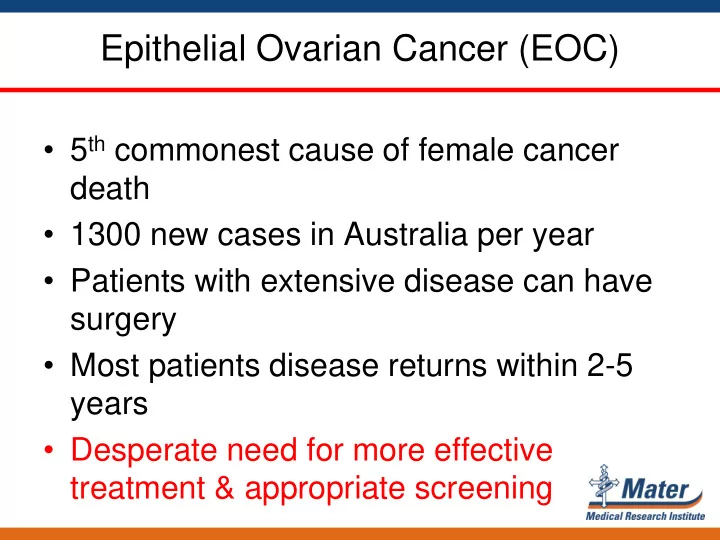

Epithelial Ovarian Cancer (EOC) • 5 th commonest cause of female cancer death • 1300 new cases in Australia per year • Patients with extensive disease can have surgery • Most patients disease returns within 2-5 years • Desperate need for more effective treatment & appropriate screening
Multi-disciplinary, collaborative cancer research model Allied health Mental health Patients support professionals Biomedical Nurses Researchers Collaborative Doctors Research Clinical trials - Surgeons - Pathologists - Medical Oncologists - Radiation Oncologists How to cure patients who have advanced cancer? - Palliative Care Physicians How to increase the quality of life of patients who have advanced cancer? How to increase the quantity of life of patients who have advanced cancer? Associate Professor John Hooper
Specimens utilised for research: “surplus to diagnostic requirements” Saliva Tissue EDTA blood Ascites
Patient sample journey Animal models Cell culture experiments SURGERY CLINICAL TRIALS Gene maps
We aim to develop treatments that overcome the cancer cell’s control of its environment DC leukapheresis lymph node precursor Improve response to chemotherapy Develop effective vaccines Cancer target loading “danger signals” killer T cells vaccination tumour cells mature DC IMPROVE SURVIVAL Observe treatment effects on genes and use as predictors of response Improve response to drugs blocking cancer blood vessels
Mater Ovarian Cancer Research Collaborative (MOCRC) • 5 YEAR GOALS: • Efficient execution of focused experiments with surgical specimens • Communicate our findings • Obtain funding for recruitment of key staff • Expand funding for project work • Expand local, national and international collaborations • Translate our findings via clinical trials • Translate our findings via strategic links with pharmaceutical companies
Thank you
Recommend
More recommend